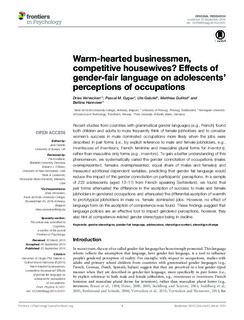| dc.contributor.author | Vervecken, Dries | |
| dc.contributor.author | Gygax, Pascal M. | |
| dc.contributor.author | Gabriel, Ute | |
| dc.contributor.author | Guillod, Matthias | |
| dc.contributor.author | Hannover, Bettina | |
| dc.date.accessioned | 2019-11-25T11:49:39Z | |
| dc.date.available | 2019-11-25T11:49:39Z | |
| dc.date.created | 2015-09-11T15:01:29Z | |
| dc.date.issued | 2015 | |
| dc.identifier.citation | Frontiers in Psychology. 2015, 6 (1437) | nb_NO |
| dc.identifier.issn | 1664-1078 | |
| dc.identifier.uri | http://hdl.handle.net/11250/2630264 | |
| dc.description.abstract | Recent studies from countries with grammatical gender languages (e.g., French) found both children and adults to more frequently think of female jobholders and to consider women's success in male dominated occupations more likely when the jobs were described in pair forms (i.e., by explicit reference to male and female jobholders, e.g., inventeuses et inventeurs; French feminine and masculine plural forms for inventors), rather than masculine only forms (e.g., inventors). To gain a better understanding of this phenomenon, we systematically varied the gender connotation of occupations (males overrepresented, females overrepresented, equal share of males and females) and measured additional dependent variables, predicting that gender fair language would reduce the impact of the gender connotation on participants' perceptions. In a sample of 222 adolescents (aged 12-17) from French speaking Switzerland, we found that pair forms attenuated the difference in the ascription of success to male and female jobholders in gendered occupations and attenuated the differential ascription of warmth to prototypical jobholders in male vs. female dominated jobs. However, no effect of language form on the ascription of competence was found. These findings suggest that language policies are an effective tool to impact gendered perceptions, however, they also hint at competence-related gender stereotypes being in decline. | nb_NO |
| dc.description.abstract | Warm-hearted businessmen, competitive housewives? Effects of gender-fair language on adolescents’ perceptions of occupations | nb_NO |
| dc.language.iso | eng | nb_NO |
| dc.publisher | Frontiers Media | nb_NO |
| dc.rights | Navngivelse 4.0 Internasjonal | * |
| dc.rights.uri | http://creativecommons.org/licenses/by/4.0/deed.no | * |
| dc.title | Warm-hearted businessmen, competitive housewives? Effects of gender-fair language on adolescents’ perceptions of occupations | nb_NO |
| dc.type | Journal article | nb_NO |
| dc.type | Peer reviewed | nb_NO |
| dc.description.version | publishedVersion | nb_NO |
| dc.source.volume | 6 | nb_NO |
| dc.source.journal | Frontiers in Psychology | nb_NO |
| dc.identifier.doi | 10.3389/fpsyg.2015.01437 | |
| dc.identifier.cristin | 1263607 | |
| dc.description.localcode | Copyright © 2015 Vervecken, Gygax, Gabriel, Guillod and Hannover. This is an open-access article distributed under the terms of the Creative Commons Attribution License (CC BY). The use, distribution or reproduction in other forums is permitted, provided the original author(s) or licensor are credited and that the original publication in this journal is cited, in accordance with accepted academic practice. No use, distribution or reproduction is permitted which does not comply with these terms. | nb_NO |
| cristin.unitcode | 194,67,40,0 | |
| cristin.unitname | Institutt for psykologi | |
| cristin.ispublished | true | |
| cristin.fulltext | original | |
| cristin.qualitycode | 2 | |

